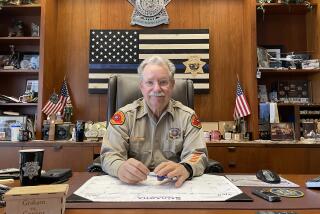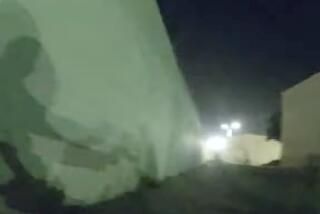Audiotape Said to Back Deputies’ Report of Shooting : Law enforcement: Recording was made of confrontation in which mentally ill man was killed.
- Share via
An audiotape that recorded the shooting of a mentally ill man in Ladera Heights by deputies contains nothing that contradicts the official account of the incident, a Sheriff’s Department station commander said Friday.
The tape does not resolve all questions about the shooting of 33-year-old Keith Hamilton in his mother’s back yard, but Capt. Rachel Burgess said it did not pick up anything indicating wrongdoing by six deputies and a sergeant who were present.
“There are areas of the tape that are not very clear and that are drowned out by the helicopter” circling above the shooting scene, said Burgess, who is the commanding officer of all the deputies involved.
But what is recorded--including voices of the deputies, Hamilton and his mother--corroborates what the deputies told Burgess shortly after the shooting, she added.
A deputy identified as Kelly Enos, 26, is heard screaming: “He’s got my leg! He’s got my leg!” just before the sound of gunfire, Burgess said.
The Sheriff’s Department contends two deputies shot Hamilton because they thought he was reaching for a knife they say was sheathed at his waist. Burgess could not recall hearing any voices on the tape talking about a knife.
The tape was made by another deputy who routinely taped his calls on a miniature recorder tucked in his pocket.
The deputies who did the shooting--Enos and Paul McCready, 27--have been relieved of duty pending the outcome of a Sheriff’s Department investigation. Enos fired three shots and McCready fired six.
An autopsy performed four days after the shooting showed that Hamilton was hit by “seven or eight” bullets, according to Dr. Griffith Thomas, an independent pathologist hired by Hamilton’s family to observe the procedure. The body had cuts and bruises on the arms and legs and had sustained at least one blow to the head, Thomas said.
A final autopsy report showing exactly where the bullets entered the body and the probable cause of the other injuries will not be completed for at least another week, according to a spokesman for the coroner. Toxicology tests also are being performed to determine if Hamilton was under the influence of PCP, as the deputies say they suspected, or any other drug.
Hamilton was found to be a schizophrenic 11 years ago. He was killed Aug. 13 after his mother and her landlord called the Sheriff’s Department to report that he had become unruly. Hamilton, who did not live with his mother, had two months ago been under a court order to stay away from the residence. That order had expired in June.
Burgess said the first two deputies to arrive called for backup because Hamilton refused to leave the property and was wearing the knife. The sergeant arrived with four deputies and designated McCready and another deputy as “shooters” in case the situation got out of hand. That procedure is routine in dangerous situations, Burgess said. Enos was not one of the designated shooters, Burgess added.
When Hamilton refused to lie face down on the ground to be handcuffed, Burgess said, the sergeant fired two shots at him from an electronic Taser gun. He “continued to resist,” she said, and a struggle ensued that led to the shooting.
Two neighbors who witnessed part or all of the incident say Hamilton was not resisting. One said he was already calmed down when the backup arrived. The other said a deputy placed an object either next to or under Hamilton’s body. A lawyer for Hamilton’s family contends the object may have been a planted knife.
The shooting has prompted State Sen. Diane Watson (D-Los Angeles), who represents Ladera Heights, to call on county supervisors to establish a procedure in which a mobile psychiatric team is automatically dispatched to incidents involving law enforcement officers and the mentally disturbed. The county Deparment of Mental Health has a limited number of such teams available on a 24-hour basis, but they have to be summoned by officers.
Most deputies, Burgess said, don’t bother to call the teams because they sometimes take hours to arrive.
More to Read
Sign up for Essential California
The most important California stories and recommendations in your inbox every morning.
You may occasionally receive promotional content from the Los Angeles Times.










